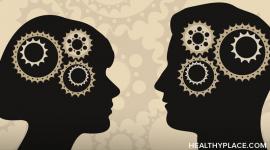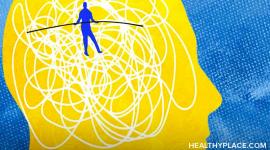What are Schizophrenia Negative and Positive Symptoms?

Schizophrenia symptoms are often classified as negative or positive symptoms. These symptoms are grouped based on whether they reflect diminished or excess function. Positive and negative schizophrenia symptoms have been seen ever since schizophrenia was first noted in medical literature over 100 years ago. (See: Schizophrenia Diagnosis and DSM IV Schizophrenia Criteria)
Schizophrenia Negative Symptoms
Negative symptoms in schizophrenia refer to a decrease or absence of normal function. An example of this is a loss of interest in everyday activities. Negative symptoms may be present years before positive symptoms in schizophrenia occur. Schizophrenia negative symptoms can be hard to diagnose as they can easily be mistaken for other disorders like depression.
Negative symptoms in schizophrenia include:1,2,3
- Apparent lack of emotion or small emotional range
- Reduced ability to plan and follow-through with activities
- Neglect of personal hygiene
- Social withdrawal, decrease in talkativeness
- Loss of motivations
People with schizophrenia who have negative symptoms often need help with everyday tasks and with taking care of themselves. It can appear like the person with schizophrenia isn’t trying or doesn’t want help, but this is just a manifestation of his or her negative symptoms.
Schizophrenia Positive Symptoms
Positive symptoms in schizophrenia refer to an excess or distortion or normal function. Positive symptoms are the ones most typically associated with schizophrenia or psychosis. These include hallucinations, which are often auditory (often hearing voices). These symptoms are the ones that generally cause people to lose touch with reality. Positive symptoms of schizophrenia can come and go and may not be noticeable at times (see 10 Early Warning Signs of Schizophrenia).
Schizophrenia positive symptoms include:
- Delusions – falsely held beliefs usually due to a distorted perception or experience. Delusions are the most common symptom of schizophrenia.
- Thought disorder – difficulty organizing and expressing thoughts. This might result in stopping mid-sentence or speaking nonsensically; including the making up of words.
- Disorganized behavior – unusual and inappropriate behavior. This might be childlike behavior or unpredictable agitation.
- Movement disorder – agitated or repeated movements. Catatonia (non-moving and non-responsive) is also possible.
Positive symptoms often respond more successfully to antipsychotic treatment.
Other Schizophrenia Symptom Types
Additional schizophrenia symptoms are also categorized as cognitive or affective. Cognitive symptoms can be very difficult to identify and include:
- Impaired memory and attention
- Difficulty thinking through complicated processes, making sense of information
- Impaired ability to organize
- Poor decision-making
- Difficulty in interpreting social cues
Affective symptoms are those that affect mood. This might be appearing gleeful or sad inappropriately. People with schizophrenia are often depressed or have mood swings.
APA Reference
Tracy, N.
(2021, December 23). What are Schizophrenia Negative and Positive Symptoms?, HealthyPlace. Retrieved
on 2025, April 13 from https://www.healthyplace.com/thought-disorders/schizophrenia-symptoms/what-are-schizophrenia-negative-and-positive-symptoms



